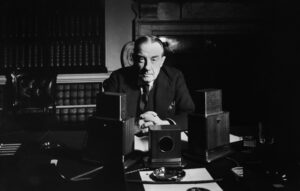A nation lost in what one American commentator described as “an orgy of self-criticism”; an exhausted Tory government out of ideas; an endemic sense of decline. This might describe the Britain of today, but it also describes the Britain of 1963, 60 years ago this weekend, as Prime Minister Harold Macmillan entered the final few weeks of his premiership, and a young Harold Wilson began writing one of the most important — and misunderstood — speeches in Britain’s post-war history. His promise was simple (at least in how it was reported): to unleash the “white heat of technology” to make Britain great again.
Today, we might not think of the Sixties as a time of crippling self-doubt and doom — we save that stereotype for the Seventies. And yet, for many at the time, 1963 was precisely such a moment. This was the year Macmillan was harried out of power under a cloud of scandal, having first failed to take Britain into Europe and then failed to get a grip on the Profumo Affair. The country was fading as a global power and had suffered the indignity of being rejected from joining the new European club by Charles de Gaulle — the man Macmillan had worked so hard to defend during the war. Books at the time captured the mood of the nation with titles such as the Stagnant Society and even Suicide of a Nation.
Dig a little deeper into this moment in time, though, and not only can you see the narrative of decline that Britain was telling itself, but also the fable underneath — the morality tale about why it was apparently decaying. In 1963, the fable went something like this: Britain was failing because it was led by crusty old men incapable of understanding the modern world, amateur-gentlemen such as the patrician old prime minister himself. “His decomposing visage and somehow seedy attire conveyed the impression of an ageing and eccentric clergyman, who had been induced to play the part of a Prime Minister,” wrote the satirist Malcolm Muggeridge. That the Conservative Party chose the 14th Earl of Home as Macmillan’s replacement only heightened the power of the country’s national lament.
If voters needed any more proof of this fable, all they had to do was look across the Atlantic. While Britain had Macmillan, the kind of man who read Aeschylus sheltering in no-man’s land, the Americans had Jack Kennedy, the very symbol of modernity. But it wasn’t just the US that seemed more advanced than Britain; to many — including Wilson — even the Soviet Union seemed more in tune with the modern world, its leaders apparently able to throw the full weight of the state behind the technologies of the future.
Today, it is hard to think of Wilson as a figure of modernity. Perhaps it is the pipe-smoking or the holidays to the Scilly Isles. Or perhaps it is because we know what he was to become: that sad, defeated figure prone to midday tears and drink who left office broken by the weight of the country’s problems. And yet, in 1963, Wilson very much was the coming figure. He was ferociously bright and energetic with an easy wit and a ground-breaking normality. In many respects, he represented as much of a break from the previous era of Macmillan as Blair did in 1997.
On October 1, 1963, speaking to the Labour Party conference in Scarborough, Wilson seemed to capture the zeitgeist as all leaders of the Opposition must. To make Britain “once again one of the foremost industrial nations of the world”, Wilson declared, the Government needed to seize control of almost every aspect of economic life. Under his leadership, the Government would “provide the enterprise and we shall decide where it goes”. And once these new enterprises had been created, he added, there would be no shortage of markets for them to sell their products. “The Russians have talked to me of orders amounting to hundreds of millions over the next few years,” he declared, airily. As absurd as this now sounds, it captured the imagination of the Labour conference — and the country at large. It also required not only a change of government, but a revolution.
“The Britain that is going to be forged in the white heat of this revolution will be no place for restrictive practices or for outdated methods on either side of industry,” Wilson declared. “In the Cabinet and the boardroom alike, those charged with the control of our affairs must be ready to think and to speak in the language of our scientific age.” The eagle-eyed will note he did not utter the phrase “white heat of technology”.
This was not a Labour leader scared of frightening the horses. “The speech was, in a sense, ‘extremist’,” wrote the historian Ben Pimlott, Wilson’s seminal biographer. “It advocated government intervention in almost every aspect of the nation’s economic life.” Yet it was also wildly popular. “It captured a moment, saying what many young and intelligent people across the spectrum urgently believed,” Pimlott concluded.
As such, in purely political terms, Wilson’s speech was a triumph, helping him on his journey to No. 10 in 1964 and sustaining him through the first few years of his premiership, injecting it with a sense of purpose and vigour. And yet, what stands out today far more than the radicalism of the speech is how much it actually conformed to the deeper trends in British politics — from its endless fascination with the country’s own (partly imagined) decline to its desperation to find quick fixes and easy solutions, often to meet some arbitrary deadline or fit the latest fashionable idea.
Consider how Wilson’s speech came about in the first place. Less than 24 hours before he stood up to lament Macmillan’s government of “lordly amateurs”, Wilson still had no idea what he was going to say. It was only at 9pm the night before, after Wilson confided to his closest aide, Marcia Williams, that he still hadn’t written his speech, that she forced him to write it there and then. “You will do it now,” she told him, bluntly, dismissing his idea that he turn to it in the morning. It was also Williams who suggested the theme: “the Science Committee stuff”. And so emerged one of the great speeches in modern British history.
The substance of Wilson’s address does not fare much better either. Wilson’s grand plan to restore Britain to some long-lost industrial greatness was always destined to fail because it both misdiagnosed Britain’s structural challenges and offered solutions which could not work. Britain was not declining on the world stage because it was run by amateurs, but because its decline was the inevitable reality of the world that came into being after the war. No amount of professionalism or central planning could reverse this trend.
Just as importantly, Wilson’s plan was also a form of misdirection, designed to avert the need for the kind of hard choices that could not be avoided, from devaluing the pound to dealing with the question of Europe to scaling back Britain’s overseas commitments. Within a few years, Wilson’s plan would, of course, fail. He would be forced to devalue sterling and, in desperation, reapply to join the European Market. The white heat of his revolution fizzled out and the country decided to give Ted Heath’s European corporatism a go instead.
Though Wilson was a remarkably gifted individual, the central thrust of his premiership failed. Yet in this respect, he is no different from almost any other prime minister. In fact, one way to understand Britain’s post-war history is as a long, futile attempt to avert the shame of relative global decline. Britain, after all, could not hope to maintain its imperial power without the empire — and it could not hope to remain so much richer than every other European country. Its relative wealth and power, therefore, were always going to atrophy.
Britain’s reckoning with this reality is like a Sophoclean tragedy, each new government fighting a losing battle against its fate. Wilson offered central planning as the route out of Britain’s decline; Heath believed “Europe” and corporatism was the solution; Thatcher opted for monetarism and free markets; and Blair some kind of third-way “reform”. After Blair, Cameron thought becoming China’s best friend would allow Britain to win the global race, as he put it, while Johnson argued that Brexit was the answer to making Britain global again. Today, many believe rejoining Europe is the grand solution to all the country’s problems.
Yet even the most cursory glance at Britain’s long-term economic growth reveals how little things change. The trend is one of slow, gradual growth lacerated by a few big scratches which tend to come from abroad — the oil crisis of 1973, the global financial crisis of 2008 or the Covid pandemic of 2020. The great turning points we usually think of — joining the European Common Market in 1973 or Margaret Thatcher’s election in 1979 — are not nearly as radical as they seemed at the time. Very little is. All the while, the “declining industries and declining areas” that Wilson identified in 1963 keep on declining.
When we look at the big picture, then, what really jumps out is the continuity. Even Wilson’s great call for a socialist revolution in 1963 was quite conservative: to make Britain “once again one of the foremost industrial nations of the world”. This, in fact, has been the great goal of almost every government. What is “levelling up” if it is not the use of the state to halt the decline of Britain’s industries and regions? It is there, too, in George Osborne’s Northern Powerhouse or Keir Starmer’s Green New Deal. And it is there in today’s anguish over HS2.
The irony in all of this, of course, is that when Wilson gave his speech lamenting Britain’s amateurish decline, the country was still one of the foremost industrial nations of the world — and the richest place in Europe. Indeed, even amid our own “orgy of self-criticism” today, Britain remains one of the foremost industrial nations in the world, overtaking France to become the eighth largest manufacturing nation in the world this year and the sixth largest economy.
As Keir Starmer prepares to deliver the most important speech of his career at the Labour Party conference next month, there will be plenty of people urging him to find a way to capture the mood of the nation in the way his hero, Wilson, managed to do 60 years ago. And they are right to do so. As leader of the Opposition, it is Starmer’s duty to present a plan that will achieve all of the things Wilson once promised: to revitalise the areas of the country which need revitalising; to use the white heat of our own 21st-century technologies to Britain’s advantage; and, most importantly of all, to ensure the UK remains one of the foremost industrial nations on earth.
But if we are to draw one lesson from Wilson’s speech it is that whatever grand plan Starmer announces, it will almost certainly fail to change the fundamental dilemmas facing Britain. Grand plans never do. There are no easy solutions, quick fixes or sweeping changes, only grinding conservative management of conditions largely beyond a government’s control. Wilson’s speech remains defining because it encapsulates so much of Britain’s post-war travails, managing to both overstate the country’s failings and his own ability to change things. And if there is a great, circular rhythm to our national life, this is surely it.
Disclaimer
Some of the posts we share are controversial and we do not necessarily agree with them in the whole extend. Sometimes we agree with the content or part of it but we do not agree with the narration or language. Nevertheless we find them somehow interesting, valuable and/or informative or we share them, because we strongly believe in freedom of speech, free press and journalism. We strongly encourage you to have a critical approach to all the content, do your own research and analysis to build your own opinion.
We would be glad to have your feedback.
Source: UnHerd Read the original article here: https://unherd.com/




